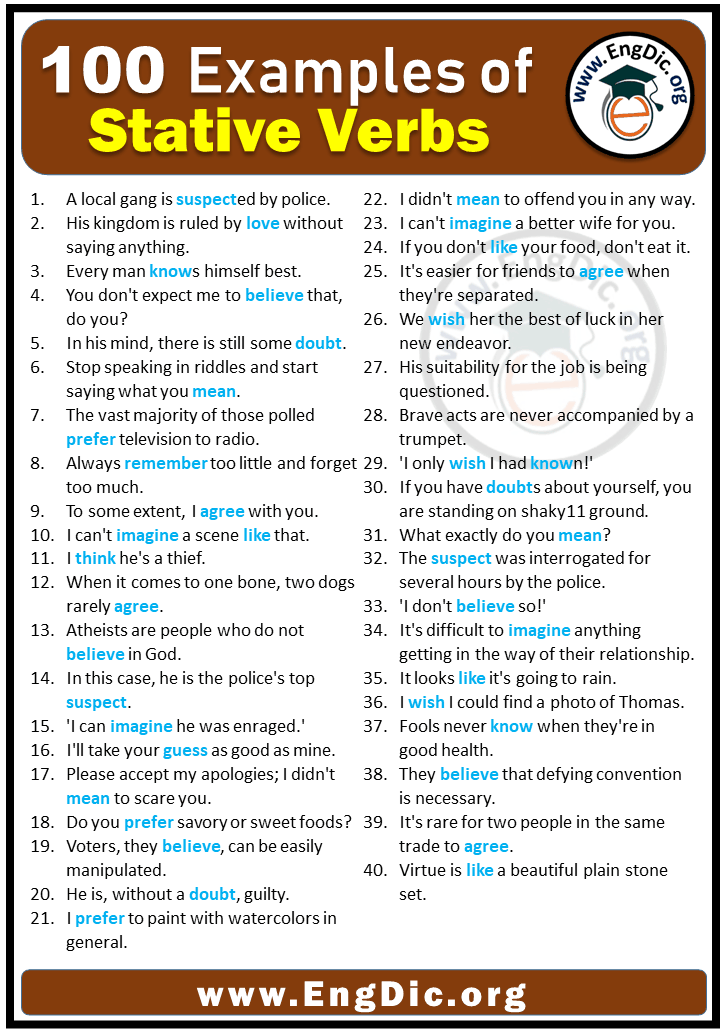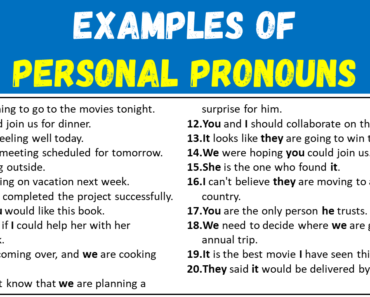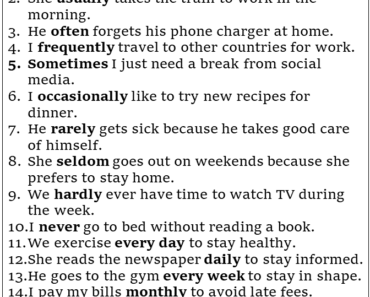When it comes to learning English grammar, stative verbs are an important component for both native and non-native speakers.
A stative verb is used to describe a state or situation rather than an action. This article will provide 100 examples of stative verbs in sentences so that readers can gain a better understanding of how to use them correctly in their own writing. Stative verbs can be tricky to use and identify, however with the examples provided readers should have no problem grasping the concept.
How to Teach Stative Verbs?
Here are some general tips on how to teach stative verbs:
- Introduce the concept: Start by explaining the difference between stative and action verbs. Stative verbs describe a state of being or a condition that is not usually associated with physical activity. Action verbs, on the other hand, describe physical actions or processes.
- Provide examples: Give examples of stative verbs and action verbs, and ask your students to identify which ones are stative and which ones are active. For example, “I am happy” is a stative verb because it describes a state of being, while “I am running” is an action verb because it describes a physical action.
- Use visual aids: Use pictures or other visual aids to help illustrate the concept of stative verbs. For example, you can use a picture of a person sitting quietly to illustrate the stative verb “to be still”.
- Provide context: Provide context for your students by using stative verbs in sentences that are relevant to their daily lives. For example, “I need a vacation” is a sentence that most people can relate to.
- Practice activities: Give your students practice activities that require them to use stative verbs correctly. For example, you can give them a list of stative verbs and ask them to create sentences using each one.
- Monitor and correct: Monitor your students’ use of stative verbs and correct any mistakes they make. Encourage them to ask questions if they are unsure about whether a verb is stative or action.
- Reinforce: Reinforce the concept of stative verbs by regularly using them in your own speech and writing, and by providing opportunities for your students to use them in class activities and assignments.
In conclusion, teaching stative verbs can be an important part of any language instruction. By helping students understand the difference between stative and action verbs, providing plenty of examples, and offering opportunities for active use and practice, you can help your students develop their language skills and communicate more effectively.
By emphasizing the importance of using stative verbs correctly and regularly reviewing and reinforcing the concept, you can ensure that your students have a strong foundation in this important aspect of language learning.
Examples of Stative Verbs in Sentences in Sentences
- I have a lot of work to do.
- He owns a luxury car.
- She possesses a great talent for singing.
- They lack the necessary funds to start their own business.
- The recipe consists of only a few ingredients.
- His job involves a lot of traveling.
- The package includes a set of new tools.
- The medicine contains ingredients that can cause drowsiness.
- I know how to speak Spanish.
- She believes in the power of positive thinking.
- He understands the importance of education.
- I doubt that he will arrive on time.
- She thinks that the movie was really good.
- He supposes that it will rain tomorrow.
- She recognizes her old friend from high school.
- I always remember my parent’s advice.
- He forgot his keys on the kitchen table.
- She imagines a world without borders.
- The word “prejudice” means to pre-judge.
- They agree to meet at the restaurant at 8 PM.
- He disagrees with his boss’s decision.
- She denies stealing the money.
- He promises to be home before midnight.
- The new job satisfies her in many ways.
- He realizes that he forgot his phone at home.
- She appears to be happy with her new job.
- The magician’s tricks astonish the audience.
- The beautiful scenery impresses the tourists.
- He surprises his girlfriend with a romantic dinner.
- She concerns herself with environmental issues.
- They love spending time together.
- I like chocolate ice cream.
- She dislikes spiders.
- He hates getting up early in the morning.
- She adores her little dog.
- They prefer to travel by train.
- She cares for her sick grandmother.
- He doesn’t mind staying at home tonight.
- She wants to buy a new car.
- They need more time to finish the project.
- He desires to travel the world.
- She wishes she had more money.
- He hopes to get the job.
- She appreciates the support of her family.
- He values honesty above all else.
- The music sounds beautiful.
- I hear a strange noise coming from the attic.
- She smells the aroma of freshly brewed coffee.
- He sees a rainbow in the sky.
- She tastes the delicious cake.
- He touches the soft fur of the cat.
- She feels the warmth of the sun on her skin.
- He looks tired after a long day at work.
- The dress costs $50.
- The distance between the two cities measures 200 miles.
- The package weighs 10 pounds.
- He owes me $20 for the dinner.
- She seems to be upset about something.
- The shirt fits perfectly.
- The success of the project depends on the team’s effort.
- It matters that we finish the project on time.
- A local gang is suspected by police.
- His kingdom is ruled by love without saying anything.
- Every man knows himself best.
- You don’t expect me to believe that, do you?
- In his mind, there is still some doubt.
- Stop speaking in riddles and start saying what you mean.
- The vast majority of those polled prefer television to radio.
- Always remember too little and forget too much.
- To some extent, I agree with you.
- I can’t imagine a scene like that.
- I think he’s a thief.
- When it comes to one bone, two dogs rarely agree.
- Atheists are people who do not believe in God.
- In this case, he is the police’s top suspect.
- ‘I can imagine he was enraged.’
- I’ll take your guess as good as mine.
- Please accept my apologies; I didn’t mean to scare you.
- Do you prefer savory or sweet foods?
- Voters, they believe, can be easily manipulated.
- He is, without a doubt, guilty.
- I prefer to paint with watercolors in general.
- I didn’t mean to offend you in any way.
- I can’t imagine a better wife for you.
- If you don’t like your food, don’t eat it.
- It’s easier for friends to agree when they’re separated.
- We wish her the best of luck in her new endeavor.
- His suitability for the job is being questioned.
- Brave acts are never accompanied by a trumpet.
- ‘I only wish I had known!’
- If you have doubts about yourself, you are standing on shaky11 ground.
- What exactly do you mean?
- The suspect was interrogated for several hours by the police.
- ‘I don’t believe so!’
- It’s difficult to imagine anything getting in the way of their relationship.
- It looks like it’s going to rain.
- I wish I could find a photo of Thomas.
- Fools never know when they’re in good health.
- They believe that defying convention is necessary.
- It’s rare for two people in the same trade to agree.
- Virtue is like a beautiful plain stone set.

Related:






